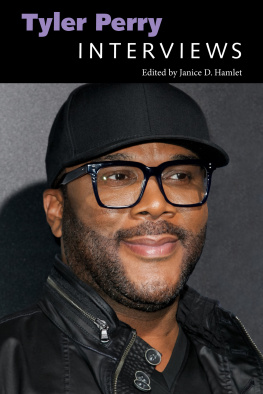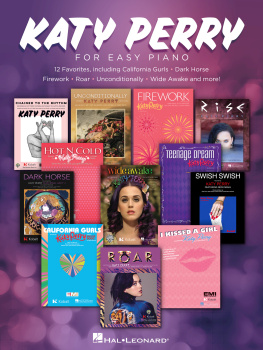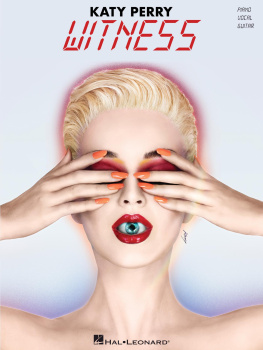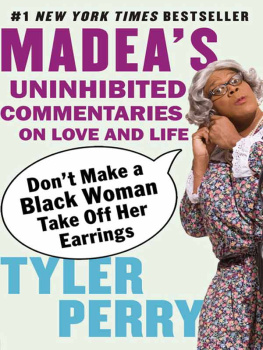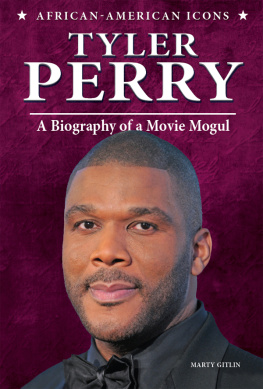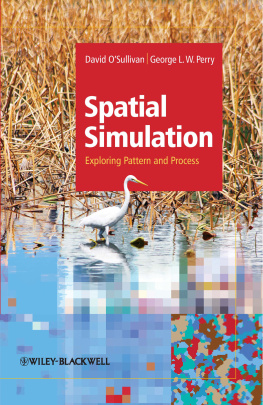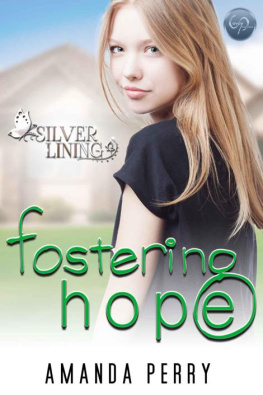
Tyler Perry: Interviews
Conversations with Filmmakers Series
Gerald Peary, General Editor
Tyler Perry
INTERVIEWS
Edited by Janice D. Hamlet
University Press of Mississippi / Jackson
The University Press of Mississippi is the scholarly publishing agency of the Mississippi Institutions of Higher Learning: Alcorn State University, Delta State University, Jackson State University, Mississippi State University, Mississippi University for Women, Mississippi Valley State University, University of Mississippi, and University of Southern Mississippi.
www.upress.state.ms.us
The University Press of Mississippi is a member of the Association of University Presses.
Copyright 2019 by University Press of Mississippi
All rights reserved
Manufactured in the United States of America
First printing 2019
Library of Congress Control Number: 2019945843
Hardcover 978-1-4968-2458-5
Trade paperback 978-1-4968-2459-2
Epub single 978-1-4968-2460-8
Epub institutional 978-1-4968-2457-8
PDF single 978-1-4968-2461-5
PDF institutional 978-1-4968-2462-2
British Library Cataloging-in-Publication Data available
Contents
Tonisha Johnson / 2005
Kathleen Cross / 2005
Kristi Watts / 2006
Kam Williams / 2008
Matthew Belloni and Stephen Galloway / 2009
Byron Pitts / 2009
Alison Keyes / 2010
Sheryl Garratt / 2010
Roger Brooks / 2011
Samantha Ofole-Prince / 2014
Eric Peterson / 2014
Rembert Browne / 2015
Sandra Varner / 2016
Aramide A. Tinubu / 2016
Christine Thomasos / 2016
Trevor Noah / 2018
Introduction
I first heard of Tyler Perry in 2002 from a student in my undergraduate rhetorical criticism class. The student approached me after class following my discussion of their first writing assignment. She asked if she could do her critical analysis on a play she had recently seen performed. A new African American playwright had written the play. His name was Tyler Perry. She asked if I had heard of him. I replied, No. After responding, I attempted to discourage her from selecting the play for critical analysis by reminding her that the process of rhetorical criticism requires a close reading of a text, employing a critical examination of the interactions between text, author and audience. To successfully accomplish this task requires that the critic read the text more than once. Trying to analyze a live performance based solely on memory would make the analysis difficult to accomplish. The student informed me that she did not merely see the performance but was able to acquire an underground copy of it on DVD. She talked about how the play was funny and culturally relevant and how this playwright was going to be famous once mainstream America discovered him. Therefore, I exhaled and said, Okay. Lets see what you do with it. The rhetorical analysis was of Perrys third play, I Can Do Bad All by Myself. The play was about a woman fighting to hold on to her husband after she was served with divorce papers. She is unaware that her husband has moved in with one of her sisters and they are planning to marry. In her despair, the woman moves in with her grandmother who had just gotten out of the hospital. Also living with her grandmother is another sister and her daughter. A young man who was recently released from jail and does odd jobs around the house also lives with the grandmother. Lastly, the grandmothers daughter comes home for a visit. Because of all of the people living in this house and the various interactions that occurr, the woman comes to the realization that her hurt and other frustrations have consumed most of her life and she needs a change. The lesson presented through this morality play is We fight so hard to hold on to the things that God, Himself, is trying to tear apart. Interestingly, instead of focusing on one or all of the sisters in the story, my student chose to focus on the grandmother, the matriarch of the family, an elderly trash-talking woman affectionately known as Madea. Throughout the play, Madea offers homespun solutions to everyones problems. The students analysis was actually good and quite informative. From reading her paper, I was introduced to Tyler Perry, the playwright. Now, some sixteen years later, my former student would likely find it amusing to discover that her former professor now owns a DVD collection of Tyler Perrys stage plays and films and has edited a collection of his interviews.
Once destitute and struggling for recognition as a playwright, Tyler Perry is now a multimedia phenomenon. Playwright, songwriter, screenwriter, producer, executive producer, director, actor, author, studio proprietor, and philanthropist, Perry has become one of the most lucrative auteurs in Hollywood, although he lives and works far from it. Perrys feature films have earned more than $500 million at the box office with an average opening-weekend gross of $25 million. This is a major accomplishment for any filmmaker but especially significant for an African American filmmaker whose films consist of mostly African American cast members. Perry credits his success, in part, to African Americans, especially African American religious women who have largely patronized his stage plays followed by his films. Therefore, Perry came to the risky business of filmmaking having already secured a loyal African American fan base nationwide through his stage plays. Consequently, this patronage allowed Perry to develop an unwavering, uncompromising, albeit audacious rhetorical style to his media creations which he writes, directs, and produces. These media creations feature social and cultural themes centered on faith, family, forgiveness, and overcoming adversity. Characters ungrudgingly implore religious and spiritual expressions in both discourse and song. Women are always at the center of the stories. Although consumers of his productions often criticize Perry for being predictable because he repeats themes and characterizations, he argues that the repetition of themes and characters is intentional because it is part of the Tyler Perry brand. A significant part of the Tyler Perry brand consists of drama and comedy laced with oral lessons trumpeting Christianity and personal accountability. He uses biblical satires to celebrate Christian culture within the comedic context of secular movies.
As a result of his childhood experiences, struggles to become known, and now his recognition as one of Americas most successful auteurs, Tyler Perry has become a sought-after guest on numerous radio and television talk shows, in print newspapers and magazines, and on internet sites. Questions frequently asked in interviews fall into one or more of the following categories: Perrys abusive childhood and the power of forgiveness; Perrys rags to riches story; the birth and popularity of Perrys most profitable character, Madea; the Tyler Perry Studios; responses to critics; and the promotion of upcoming movies, whether ones he created or those created by others in which he has a starring role.
Tyler Perry, named Emmitt Perry Jr., was born on September 14, 1969, in New Orleans, Louisiana. Often the recipient of his fathers rage, Perry encountered frequent physical, verbal, and emotional abuse throughout his childhood. Perry has informed some of his interviewers that he often took refuge in the crawlspace of his childhood house to escape his father. His only comfort was his mother who would take him to church on Sundays. As a participant in his communitys African American church, Perrys artistic career combining electrifying gospel music with theatricality did not begin with his plays but as a young member of a church choir. Perry discovered early in his life that religion could be not only spiritual but entertaining as well. As a result, he infused African American worship practices into many of his stage plays, films, and television shows, accompanied by the energetic gospel traditions he had enjoyed in church. Perry frequently tells audiences that these experiences resulted in an empire grounded in Christian messages that focus on the challenges, aspirations, and, sometimes, eccentricities of church-going African Americans but whose storylines can be appreciated by a global audience.
Next page
